|
Most pen collectors know that Settimo Torinese was for many years the epicenter
of pen making in Italy. At one stage, in the 1940s, there were over 150 independent
pen manufacturers operating in Settimo.
Most of them were driven out of business in the mid-50s, by the arrival of
inexpensive and practical ballpoint pens and the concurrent decline of the fountain
pen. Some of them reacted, re-tooled, survived the change and eventually thrived:
Universal, a company that has been in the pen business since the early 1930s now
makes 4 million ballpoint pens a day, being second only to BIC in the sheer quantity
of pens manufactured.
However, even in the midst of the ballpoint revolution, there was, in Italy
and in the rest of the world, a fountain pen that everyone wanted, a pen that
was considered the most practical, prestigious and elegant of all: the Parker
51.
One of Settimo’s most capable penmakers had moved to France immediately
after the end of WW2. He was one of the best makers of celluloid, ebonite and
casein pens. In Paris, he was offered a very attractive job by a costume jewelry
manufacturer, the French subsidiary of a large U.S. company. Unfortunately for
him, he was unable to get a permanent residence permit from the French authorities
and was forced to return to Italy.
Back in Settimo, he worked from home, manufacturing parts for several local
penmakers. Like many others in Italy right after World War 2, he was struggling
to make ends meet.
One of the pen distributors that was operating in Settimo asked him if he
had the ability to make believable fake Parker 51 pens. The Parker 51 was the
most desirable pen of the time and there were actual shortages of Parker pens,
as the factories could not keep up with demand. In postwar Italy, street vendors
were very active; many foreign tourists and U.S. G.I.s were always looking for
impossibly good deals in the streets, hoping to find goods of uncertain origin
at rock bottom prices.
Our Settimo penmaker started manufacturing copies of the Parker 51. He would
build his 51s in lots of 20,000 pens; he would fill several suitcases and take
the pens to Genoa by train, hoping all the while that no one would stop him. He
would then drop the pens off at the Genoa train station and return home on the
very next train.
Most of the pens were sent to Naples from Genoa, where they were sold in the
streets and in local open air markets, mostly to unsuspecting foreigners.
The penmaker sold his pens for a few cents each, and they fetched a fairly
good price on the streets. The people making money were the distributors and street
hawkers.
This illegal operation was known in the pen community of Settimo.
Soon the operation became more organized and more daring: special shipping
crates were built, with false bottoms, to house the fake 51s. The double bottoms
were, officially, required to provide insulation to the contents of the crates,
but the truth was different: they were tools made for smuggling pens.
Other penmakers started making 51 copies: at least two versions are known,
with slight changes in their internal design.
The pens found new markets: in addition to Naples, they were also sold in
Venice and Rome, again, prime territories for the tourist trade. Most pens were
sold outside big hotels or near main tourist attractions.
The situation changed almost overnight when A.P.I., the official Parker distributor
for Italy, became aware of the problem and alerted the Italian police. A couple
of police raids followed in Settimo almost immediately. It so happened that most
of the workshops that were being raided had some advance notice of the fact and
managed to destroy much of the evidence, including the tools and dies used for
making the pens. Some penmakers were seen crawling out of windows, as the police
knocked on their door!
One police squad stopped one of the forged-51 manufacturers on the street
and asked him for directions to his very workshop! Needless to say, he took off
in the opposite direction!
The involvement of the fraud squad rapidly put an end to the Settimo P-51
adventure.
In truth, many of the penmakers involved were either very poor or very young
and I do not believe that any of them did any jail time for their crimes.
A.P.I. established a registration scheme that guaranteed the authenticity
of the goods to the buyers of legitimate Parker 51 pens.
How good were the Settimo 51s?
As I mentioned, two slightly different variants exist.
We will have a close look at these pens, which are now extremely rare and much
more valuable to pen collectors than the very pens that they tried to imitate.Let’s
examine the pens!
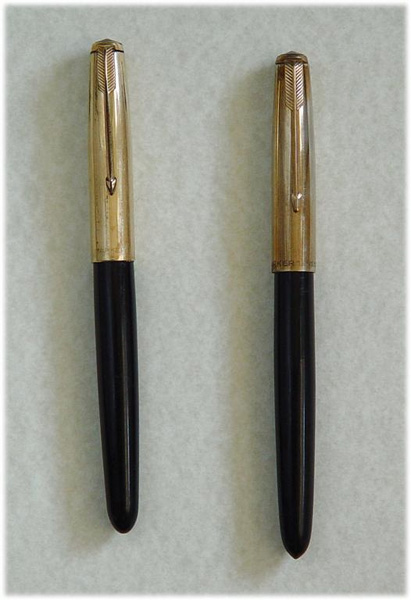
The first photo shows two pens, one is an authentic Parker 51, the other is
one of the Settimo fakes. The differences, at least from this photograph, are
barely discernible. The Settimo pen is the one on the right.
The cap of the Settimo 51 is a close copy of the original, and includes the
original wording, although the lettering is slightly more coarse than in the Parker
pen.
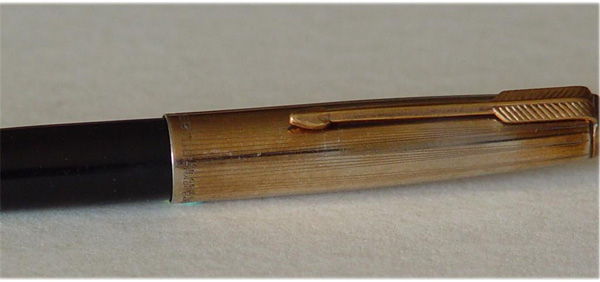
One of the two fake 51s also has the word PARKER thinly engraved just above
the section.
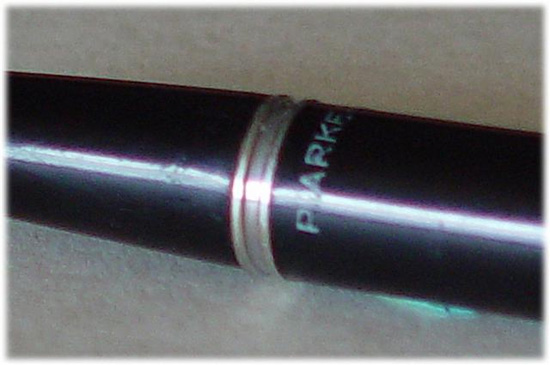
Once we disassemble the pen, the differences become more apparent, although
there is no doubt that an occasional buyer would have been easily fooled by the
italian pen. The famous Parker 51 collector is not used in the italian pen. In
its place there is an adaptor that closely resembles the collector in shape and
size. The one shown in the photograph appears black because of the staining effect
of the ink: in actual fact is is made of transparent plastic, and, if pristine,
would look a lot like the Parker collector. The other Settimo P-51 has a similar
adapter made in white translucent nylon.
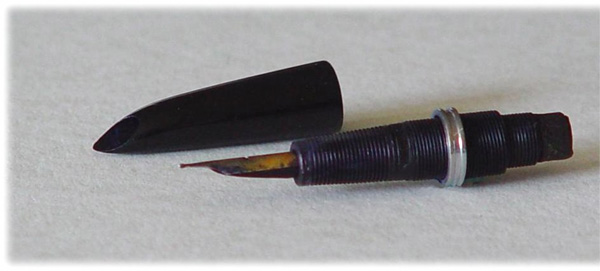
The nib is of conventional shape, unlike the original Parker nib which is
tubular in shape. The italian nib has no iridium pellet, the tip is formed by
folding the tines.
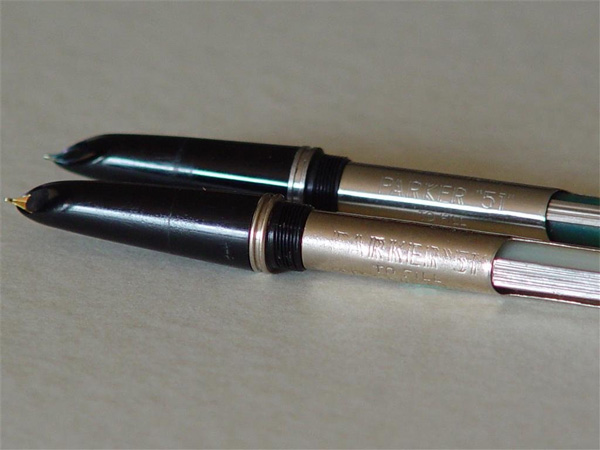
The writing on the Aerometric filler reproduces the words and style of the
original. The quality of the markings, however, is rather rough and the legends
seem to have been pantographed, while the Parker markings are roll-pressed.
Another, closer view of the italian filler shows the lower quality,of the markings.
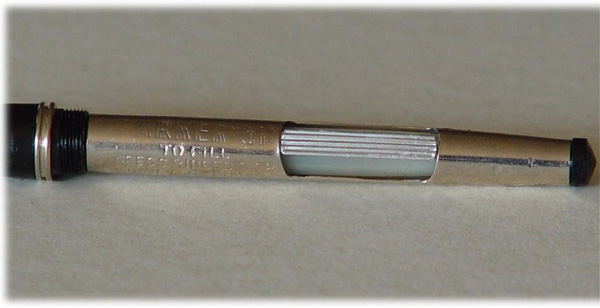
And a side-by-side view of the copy and the original shows both the differences
and also the remarkable similarities between the two pens.
The italian pen is NOS and the filler clarity shows that it has never been inked.
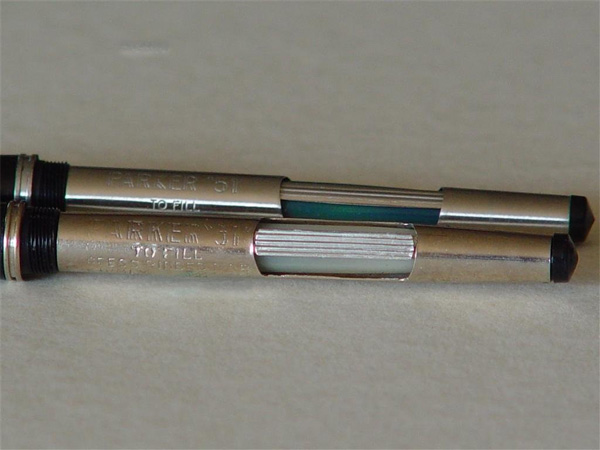
The italian pen even retains the recommendation for the use of genuine Parker
Superchrome ink...
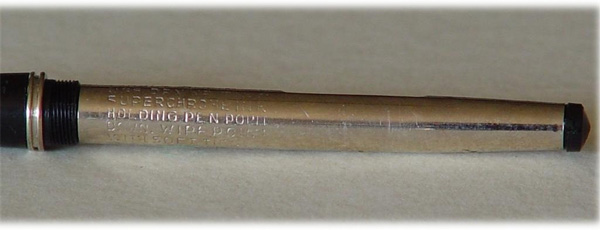
The feed used in the Settimo pen is made of ebonite and is well matched to
the nib: this pen was probably a good writer, in spite of the low quality of the
nibs used.
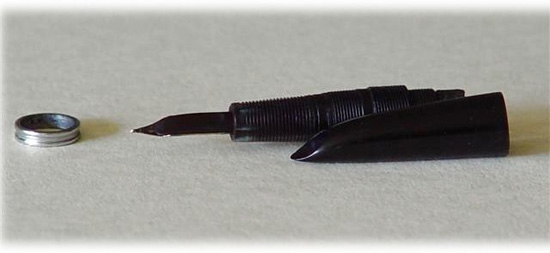
The nib, once covered by the hood, looks a lot like the “real thing”,
even though, in reality, its shape is quite different from the Parker nib.
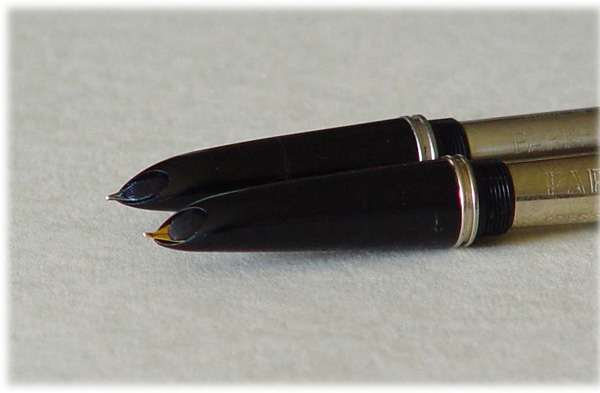
The cap jewel is a close copy of the Parker one; much closer, in fact, than
the plastic jewel used in the recent Parker 51 Limited Edition pen made by Parker
in the United Kingdom.
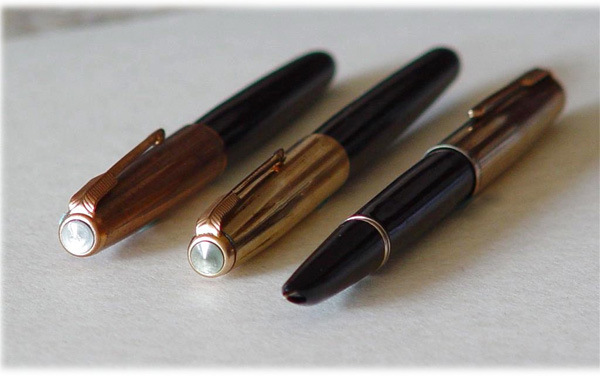
The real Parker 51 is in the center.
After the incident of the fake Settimo Parker 51 pens, A.P.I., the Italian
official Parker distributors, issued a Certificate of Authenticity with all their
Parker 51 pens and instituted a customer registration system to protect customers
against counterfeit pens. The picture shows a Parker 51 set with the official
Certificate of Authenticity. All Parker 51 pens sold in Italy from then on were
individually numbered and the number on the pen had to match the number on the
certificate. In addition, the customer could call A.P.I. at the time of purchase
to ensure that the pen being purchased had been supplied to the correct retailer.
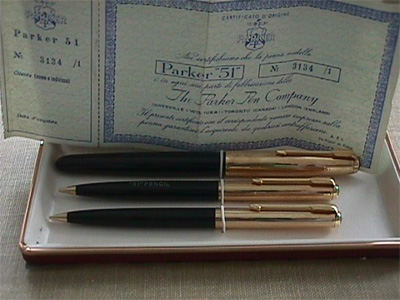
This picture shows two of the Settimo Parker 51 copies (slightly different
models, made by two different penmakers) together with an authentic Parker 51.
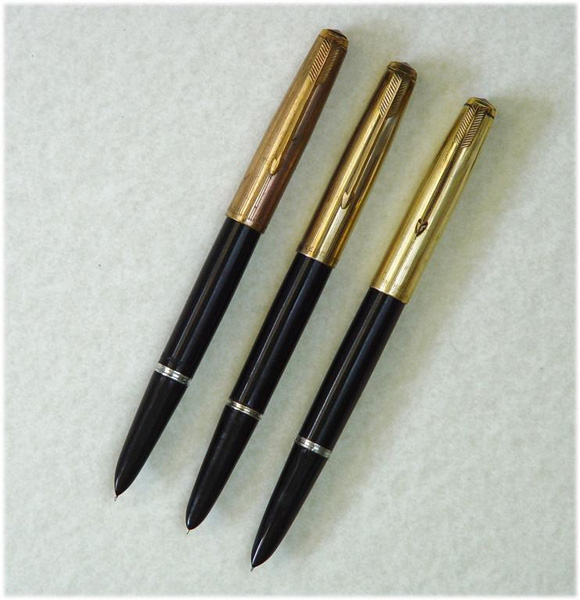
The real Parker is the pen on the right.
The “fake Parker” chapter is certainly not one of which the penmakers
of Settimo are proud; in fact, it is very difficult, even after fifty years, to
get them to provide much information. It is, however, of great interest to pen
collectors, as the Settimo Parker copies are now quite rare and constitute a very
valuable addition to any Parker 51 collection.
© 2003 Giovanni Abrate
|